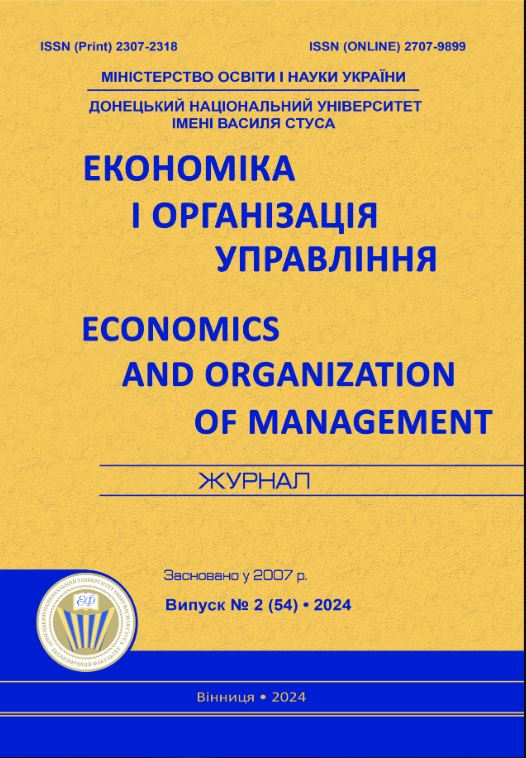Post-war reconstruction of european countries (Marshall Plan): the role of international economic cooperation
DOI:
https://doi.org/10.31558/2307-2318.2024.2.10Keywords:
post-war recovery, Marshall Plan, restructuring, European countries, international economic cooperation, economic crisisAbstract
The article is devoted to a comprehensive analysis of the post-war reconstruction of European countries in the context of the Marshall Plan, with an emphasis on assessing its economic efficiency and the role of international economic cooperation. The study highlights the main goals and objectives of the Marshall Plan, including the restoration of cities and villages, reconstruction of industrial and agricultural production, infrastructure development, financial stabilisation and elimination of trade barriers. Particular attention is paid to the non-financial aspects of the Programme, including the initiation of integration processes and the introduction of market policies in the recipient countries. Based on the analysis, the article offers recommendations for the current practice of international economic assistance and cooperation, including hybrid financing models, domestic and international economic policy development, human capital development, digital transformation, effective economic strategies, prevention of monopolisation and fight against corruption. Thus, the article analyses the valuable lessons of the Marshall Plan implementation and emphasises the importance of international economic cooperation and innovative approaches to addressing modern economic challenges.
References
Long J. B., Eichengreen B. The Marshall Plan: history’s most successful Structural Adjustment Program. Cambridge (MA). NBER Working Paper. 1991. № w3899. URL: https://ssrn.com/abstract=226738 (дата звернення: 28.05.2024 р.).
Barakat S., Hoffman B. Post-Conflict Reconstruction: Key Concepts, Principal Components and Capabilities. Post-conflict Reconstruction Strategies. International Colloquim, Stadtschlaining. June 23–24. 1995. P. 75–96.
Bessel R. Germany 1945: From War to Peace. London, New York, Sydney, Toronto: Simon & Schuster. 2009. 522 p.
Dulles A.W. The Marshall Plan. Oxford: Berg Publishers. 1993. 160 p.
Lederach J. Building Peace: Sustainable Reconciliation in Divided Societies. Washington D.C.: United States Institute of Peace. 1997. 97 p. URL: https://pestuge.iliauni.edu.ge/wp-content/uploads/2017/12/John-P.-Lederach-Building-Peace.-Sustainable-Reconciliation-in-Divided-Society.pdf (дата звернення: 28.05.2024 р.).
Lake A. After the Wars: Reconstruction in Afghanistan, Indochina, Central America, Southern Africa and the Horn of Africa. New Brunswick, NJ: Transaction Publishers, 1990. 196 p.
Smith D. Trends and Causes of Armed Conflicts. Berghof Handbook for Conflict Transformation. URL: https://core.ac.uk/download/pdf/71735671.pdf (дата звернення: 28.05.2024 р.).
Eichengreen B. Institutional prerequisites for economic growth: Europe after World War II. European Economic Review. 1994. 38(3-4), p. 883–890. URL: https://doi.org/10.1016/0014-2921(94)90124-4 (дата звернення: 29.05.2024 р.).
Gosse J.-B., Schneider A., Vicquery R. Lessons from the Marshall Plan for the European Recovery Plan / Banque de France. Eco Notepad. 2021. Post №. 236. URL: https://blocnotesdeleco.banque-france.fr/sites/ default/files/billet_236_ve.pdf
Machado B. F. In Search of a Usable Past: The Marshall Plan and Postwar Reconstruction Today. The George C. Marshall Foundation. 2007. 186 p.
Reinert E. S. How rich countries got rich... and why poor countries stay poor. 2019. Hachette UK.
Judt T. Postwar: A history of Europe since 1945. Penguin. 2006.
Богдан Т. П. Основні принципи формування і спрямування міжнародної фінансової допомоги для України. Економіка України. 2015. № 4. С. 36–44. URL: http://economyukr.org.ua/docs/EU_15_04_036_uk.pdf
Гуменюк В. В. Зарубіжний досвід повоєнної трансформації державного управління і уроки для України. Економіка України. 2022. № 8. С. 34–54.
Кістерський Л. Л. Формування сучасної Європи: стримування та розвиток. Економіка України. 2015. № 4. С. 19-27. URL: http://economyukr.org.ua/docs/ EU_15_04_019_uk.pdf
Нестор О. Ю. Особливості Плану Маршалла в контексті його економічного аспекту і переваг та недоліків реалізації. Фінанси України. 2022. № 9. C. 79-97.
Marshall G. C. The Marshall Plan Speech at Harvard University, 5th June 1947. URL: http://marshallfoundation.org/marshall/the-marshall-plan/marshall-plan-speech/ (дата звернення: 29.05.2024 р.).
The Marshall Plan Rebuilding Europe. U.S. Department of State/Bureau of International Information Programs. URL : http://shenyang.usembassy-china.org.cn/uploads/ images/5YLDd1gmyNoNIXrVRNwY1A/marshallplan.pdf (дата звернення: 28.05.2024 р.).
The Economic Cooperation Act of 1948. URL: http://www.foia.cia.gov/sites/ default/files/document_conversions/1700319/1948-04-03b.pdf (дата звернення: 28.05.2024).
Ozer M. The Effects of the Marshall Plan Aids to the Development of the Agricultural Sector in Turkey, the 1948-1953 Period. International Journal of Economics and Financial. 2014. Issues. 4. PP. 427-439.
Матюшенко І. Ю. Практичні аспекти Плану Маршалу для України: можливість відродження української економіки. Харків. 2015.

